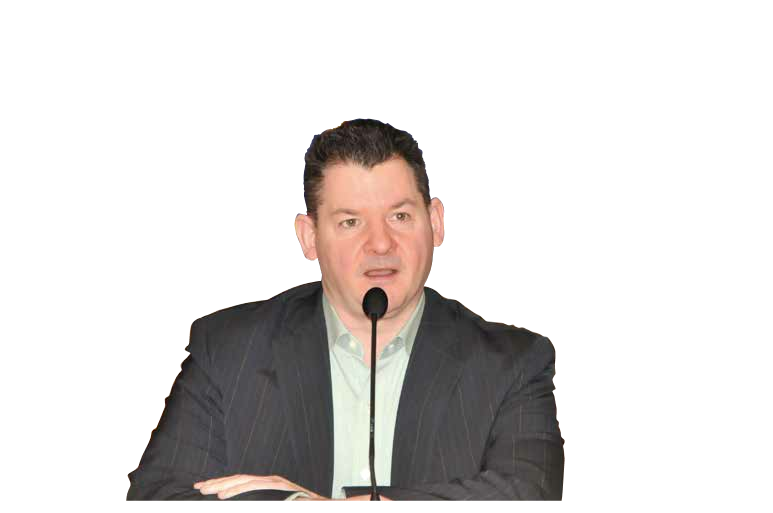Issue:
The noted journalist told some early risers at the Club’s “Asakai” that while Abenomics shows promise, he’s still waiting for the product
Long-term Asia-watcher and journalist William Pesek played host to an early morning FCCJ crowd on Jan. 14, giving a stimulating briefing and answering questions at the second of the Club’s “Asakai” breakfast gatherings. Pesek touched on a variety of subjects ranging from the entry into the global economy of three billion Asian consumers, to economic growth policies, nuclear power and nationalism.
Pesek’s work for Bloomberg News is a must-read for the financial community on both sides of the Pacific, and he opened with some positive thoughts about “Abenomics,” the economic revitalization program named after Prime Minister Shinzo Abe. “There is something in the air, not only in Japan but globally. If you put “Japan” in a headline 14 months ago, no one really cared,” he said. “Now, people can’t get enough of it.”
The first and second arrows of Abenomics, monetary and fiscal stimulus, have been impressive, according to Pesek, who found it fascinating to see Abe come back as someone who bears very little resemblance to the first-term Abe. “I’ve been impressed this far,” he said. “The government has been on message and has talked big.”
In many ways, Abenomics is a brilliant, splashy and fascinating marketing campaign, said Pesek. “But I’m waiting for something that I can see, touch, turn upside down and get a feel for,” he added. “I’m still waiting for the product. In many ways, 2013 was a missed opportunity for Abenomics.”
Before touching on Japan’s growth potential, Pesek noted that for the first time in history, about three billion people in Asia are stepping into the global economy at the same time. “What do Stuart Mill, John Maynard Keynes and Joseph Schumpeter the economists we studied in school have in common?” he asked. “One, they’re all economists we studied in school. Two, they’re all white men. Three, they’re all dead. You have to feel bad for them, because they missed the most important story in world economics: the second rise of the Asian continent.”
Pesek said that there are many things Abe must do to show the world that the third arrow is in flight. “I’m not sure that going to Turkey to sell nuclear power plants for Hitachi is the best use of his time. I’m not sure that going to Yasukuni Shrine is good use of his time. And I’m not sure that going to Mozambique at this time makes a lot of sense,” he said, adding that one way for Abe to have gone about after introducing his growth strategy would‘ve been by pitching a new, specific, big reform each month.
During the question and answer session, Pesek was queried about his view on the restart of nuclear power plants. He said that the only way Abenomics will work is if the nuclear power plants begin to hum very quickly. So if the next governor of Tokyo is anti-nuclear, big problems lie ahead. “I don’t think that [former Prime Minister Junichiro] Koizumi is trying to hurt Abe. He is looking at the calculus, he is very good at seeing what people want and giving it to them.
Koizumi is speaking for the average Japanese person, which is that energy is a growth industry for Japan,” said Pesek. “I think that Koizumi is talking about a kind of Manhattan Project in reverse. (…) Japan’s future is energy, energy, energy.”
Pesek also touched upon nationalism and the disingenuous passage of the Secrecy Bill. “The whisper campaign for the Abe government was: ‘Well, the U.S. is asking for this, so we’re going do it.’ That’s not exactly true,” he said.
“The U.S. was asking that Japan plug up the fact that a lot of information doesn't get out. But the U.S. didn’t ask Abe to set out jail terms for journalists who might ask the wrong question to the wrong person. The U.S. didn’t ask Abe to put whistleblowers in prison for five or ten years. The U.S. didn’t ask Abe to write a law that is so ambiguous that no one knows where the lines are,” said Pesek. “I’m not sure the U.S. asked Abe, in many ways, to allow nameless, faceless bureaucrats out there to make these decisions.”
“What worries me is the kind of Fukushima effect,” he added. “If there is another big earthquake in the next year or two, will we know the state of nuclear reactors 135 miles away from Tokyo?”
Pesek took up the nuclear issue once more during the question and answer session when asked for Abe’s legacy: “If we could jump ten years into the future, I don't think history is going to judge Abe on the economy. I think it’s going to judge him on his legacy of Fukushima,” he said. “It’ll be really interesting when Germany comes out and says, ‘We have doubts about participating in the 2020 Games because of radiation readings.’ I think that Fukushima is a much bigger issue than anyone thinks.”

Daniel Leussink is a Dutch freelance journalist who has been based in Japan since 2007.

